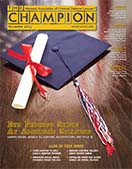November 2015

Are the most basic elements of fairness and due process missing from college procedures in campus sexual assault cases?
Articles in this Issue
-
Affiliate News
Affiliate News for November 2015 Champion.
-
Appellate Advocacy
A potential client, who pled guilty and has been sentenced, is unhappy with the sentence and wants to appeal. However, the client waived the right to appeal. The waiver seems to cover the sentence. In all likelihood, the client also waived the right to challenge the sentence in postconviction proceedings. Can counsel avoid the waiver and, if so, will the client benefit or be worse off?
-
Attorneys’ Knowledge And Beliefs About Expert Credibility, Scientific Evidence, and Expert Error
Defense attorneys sometimes face the daunting task of deciding what type of expert to employ. NADCL members participated in a study that answered three questions. How knowledgeable are attorneys about empirically supported indicators of perceived expert credibility? Do attorneys prefer forensic or social scientific evidence? What do attorneys believe concerning the frequency and nature of errors made by their experts compared to errors made by other attorneys’ experts?
-
Book Review: Fundraiser A: My Fight for Freedom and Justice
Book Review: Fundraiser A - My Fight for Freedom and Justice reviewed by David Raybin. Robert Blagojevich’s book recounts his life-changing experience when facing the power of the United States of America, hell-bent on providing him with a prison cell adjacent to his more famous brother.
-
Book Review: Rise of the Warrior Cop - The Militarization of America’s Police Forces
Radley Balko lays out the reasons the police usually target peaceful citizens in an incredibly well-researched tome. Importantly, he does a good job of not blaming the police force, but rather the failed policies that give officers incentives to target the least harmful suspects.
-
Campus Sexual Assault Allegations, Adjudications, and Title IX
When a college student has been accused of a campus sexual assault, what adjudication procedures should the school follow? Cases challenging administrative expulsions from school are now percolating into state and federal courts, and courts are finding the treatment of the accused appalling. And what are the implications of “yes means yes” laws?
-
DVD Review: Released
DVD Review: Released reviewed by Sejal H. Patel. In the film, Torres and three other former inmates shared their life stories from adolescence to incarceration to redemption.
-
Fighting for the Underdog - Heeney Award Winner Peter Goldberger
Heeney Award winner Peter Goldberger is profiled.
-
From the President: Flawed Science in the Courtroom. Is Excluding It Really That Difficult?
The testimony and evidence from forensic experts often fall short of “science” as that term is understood in the broader scientific community.
-
Getting Scholarship Into Court Project
Getting Scholarship Into Court Project November 2015 Champion.
-
Inside NACDL: Due Process Crisis on Campus: An Isolated Phenomenon or a Harbinger of More Overcrimin
California and New York have passed “yes means yes” laws that apply to college campus disciplinary proceedings when a sexual assault has been alleged. These laws may result in an accused person having to prove innocence.
-
Using Gesture to Help Calm a Nervous Witness
What a witness says on the stand is of paramount importance, but physical behavior also plays a significant role in communicating with the jury. Special attention should be paid to the gestures a witness uses — or does not use — while testifying. Encouraging a witness’s natural gestural behavior helps calm nerves. Communication consultant Brian K. Johnson discusses six steps attorneys can take to help witnesses feel as natural as possible while looking confident and trustworthy.
-
When Acquittal Is Just a Tweet Away: Obtaining Historical Social Media Evidence From Service Provide
Social media websites can provide a digital goldmine of potential evidence, such as group memberships, tweets, and photos. Even if defense counsel can view postings, however, the viewable material is often limited to recent content. As a result, defense counsel may need to subpoena missing information under Fed. Rule Crim. P. 17(c). An obstacle to such subpoenas is the Stored Communications Act, a shield that service providers rely on to refuse compliance. What potential legal arguments are available to the defense to help fight for the production of social media evidence?
